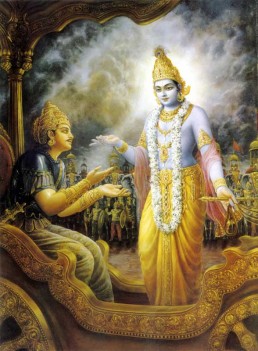Swami Chinmayananda
Swami Chinmayananda Commentary
Even though in the previous stanza, while describing the high-souls, (a) the “Path-of-Knowledge” was indicated, here the other two main “Paths” of self-integration and self-development are hinted at, viz., (b) single-pointed devotion and (c) selfless activity undertaken in the true Yajna-spirit.
GLORIFYING ME ALWAYS — The grossest type of glorification is done usually by a noisy crowd singing the Lord’s glories with the accompaniment of equally noisy and crude instruments! But the implication of Kirtana is much more sacred. Indeed, to adore an ideal with reverence and devotion, and to sing His glories, at all times, continuously, is the silent act of a mind that has fully opened up to appreciate the ideal that one has learnt to glorify. The silent adoration of society by the social-workers, or the steady flow of love that beams out from a man of Knowledge for the entire kingdom of the living, constitute a greater and a more potent type of Kirtana, than the type indulged in by the noisy crowds that assemble from their different fields of dubious activities, for a short period each day, only to return to the same dens of vices, after the Bhajana.
STRIVING WITH FIRM RESOLVE — These are simple logical facts that are generally overlooked by the seekers and they dig the graves for their own success in spiritual practices. The majority of people believe that some specific routine acts of devotional flavour pursued physically for a short period of time on particular days of the week, is all their part of the game. The rest is for their imaginary gods to cook and bring in front of them, dressed to taste! This absurd, superstitious idea has nothing to do with the Science of Self-perfection, of which religion constitutes its technical aspect.
Constant and conscious effort is unavoidable if an individual is to get himself hauled out from his present ruts of wrong thinking and false valuations of life and living. The disharmony he experiences in life, and the wrong notes that are sung by the situations in life upon the harp of his heart are all due to the maladjustments in his instruments-of-experience. Their readjustment calls for continuous vigilance, non-stop self-application, and sincere pursuit.
Of course, while thus striving for self-redemption, vacillations caused by instinctive biological temptations would often reach the seeker to whisper in his ears and make him eat the ‘FORBIDDEN FRUIT.’ But at such moments of strong temptations, he must make a firm resolve (Dhridha-Vratah) to reject the false and to walk steadily the path-of-the-Real.
True devotion is unalloyed love. Love is measured in terms of the lover’s identification with the beloved. Devotion to “ME, THE ORIGIN OF BEINGS, AND THE IMMUTABLE” is the way for the deluded ego to identify itself with the Self. And this is brought to a successful culmination only by the process of detaching itself from its non-Self conditionings. This negative aspect of self-withdrawal from the layers of the non-Self is indicated by the “BOWING DOWN TO ME.” The positive side of the art of Self-realisation is pursued, when, with a steady single-pointed mind, the seeker comes to meditate till, ultimately, he re-discovers for himself his total identification with the Self. This positive aspect is indicated by the phrase: “IN DEVOTION.”The withdrawal of ourselves from our misconceived identities and the final re-discovery of our infinite potentialities, through our constant devotion to the Self, can be achieved only by those among us who “ARE STEADFAST ANDWORSHIP ME.”
The “Path-of-Knowledge” knows no flower-throwing or chandana-sprinkling methods of ritualistic worship. To keep in the mind an alert and vigilant flow of thoughts in our adoration for the nature of the Self as the Substratum of the entire Universe and the Essence in all beings is the truest worship that can open up the buds of our ego-centric lives into blossoms of God-men, wafting their fragrance of Perfection around.
Adi Sankara Commentary
Satatam, always; kirtayantah, glorifying; mam, Me, God, who am Brahman in reaility; ca, and; yatantah, striving, endeavouring with the help of such virtues as withdrawal of the organs, control of mind and body, kindness, non-injury, etc.; drdha-vratah, the men of firm vows those whose vows [Vows such as celibacy], those whosevows are unshakable; upasate, worship Me; namasyantah, by paying obeisance; mam, to Me, to the Self residing in the heart, ca, and; nitya-yuktah, being ever endowed; bhaktya, with devotion. The various ways in which they adore are being stated:
The Bhagavad Gita with the commentary of Sri Sankaracharya – Translated by Alladi Mahadeva Sastry
Holy Geeta – Commentary by Swami Chinmayananda
The Bhagavad Gita by Eknath Easwaran – Best selling translation of the Bhagavad Gita
The Bhagavad Gita – Translation and Commentary by Swami Sivananda
Bhagavad Gita – Translation and Commentary by Bhaktivedanta Swami Prabupadha
Srimad Bhagavad Gita Chapter 9 – Verse 14 – 9.14 satatam kirtayanto – All Bhagavad Gita (Geeta) Verses in Sanskrit, English, Transliteration, Word Meaning, Translation, Audio, Shankara Bhashya, Adi Sankaracharya Commentary and Links to Videos by Swami Chinmayananda and others – 9-14

